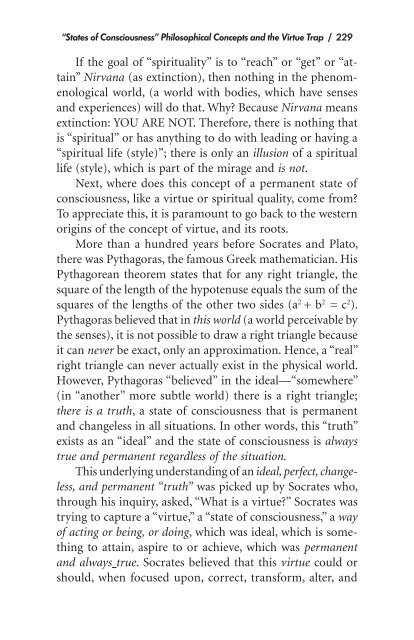- Page 2 and 3:
You Are Not
- Page 4 and 5:
You Are Not Beyond the Three Veils
- Page 6 and 7:
Photo #1 here AvADHUT niTYAnAnDA
- Page 8 and 9:
ACknOWlEDGEMEnTS Gregory Sawin (for
- Page 10:
Chapter 11: Beyond the Blankness 13
- Page 13 and 14:
xii / You Are Not all experiences,
- Page 15 and 16:
xiv / You Are Not a freeway going 6
- Page 17 and 18:
xvi / You Are Not 8) There is no un
- Page 19 and 20:
18 / You Are Not that before the I
- Page 21 and 22:
20 / You Are Not Without hesitation
- Page 23 and 24:
6 / You Are Not see “what is” (
- Page 25 and 26:
8 / You Are Not There is only THAT
- Page 27 and 28:
10 / You Are Not May this book give
- Page 29 and 30:
12 / You Are Not So, as “his unde
- Page 31 and 32:
14 / You Are Not all that “you”
- Page 34 and 35:
CHApTER 4 The Physiology of I AM KO
- Page 36 and 37:
The Physiology of I AM / 19 before
- Page 38 and 39:
The Physiology of I AM / 21 neled b
- Page 40 and 41:
The Physiology of I AM / 23 system
- Page 42 and 43:
CHApTER 5 The structural differenti
- Page 44 and 45:
The structural differential diagram
- Page 46 and 47:
The structural differential diagram
- Page 48 and 49:
The structural differential diagram
- Page 50 and 51:
The structural differential diagram
- Page 52 and 53:
The structural differential diagram
- Page 54 and 55:
The structural differential diagram
- Page 56 and 57:
The structural differential diagram
- Page 58 and 59:
The structural differential diagram
- Page 60 and 61:
The structural differential diagram
- Page 62 and 63:
The structural differential diagram
- Page 64 and 65:
The structural differential diagram
- Page 66 and 67:
The structural differential diagram
- Page 68 and 69:
The structural differential diagram
- Page 70 and 71:
The structural differential diagram
- Page 72 and 73:
Questions and Answers & exercises /
- Page 74 and 75:
Questions and Answers & exercises /
- Page 76 and 77:
Questions and Answers & exercises /
- Page 78 and 79:
Questions and Answers & exercises /
- Page 80 and 81:
Questions and Answers & exercises /
- Page 82 and 83:
Questions and Answers & exercises /
- Page 84 and 85:
Questions and Answers & exercises /
- Page 86 and 87:
Questions and Answers & exercises /
- Page 88 and 89:
Questions and Answers & exercises /
- Page 90 and 91:
Questions and Answers & exercises /
- Page 92 and 93:
Questions and Answers & exercises /
- Page 94 and 95:
Questions and Answers & exercises /
- Page 96 and 97:
Questions and Answers & exercises /
- Page 98 and 99:
Questions and Answers & exercises /
- Page 100 and 101:
Questions and Answers & exercises /
- Page 102 and 103:
Questions and Answers & exercises /
- Page 104 and 105:
Questions and Answers & exercises /
- Page 106 and 107:
Questions and Answers & exercises /
- Page 108:
Questions and Answers & exercises /
- Page 111 and 112:
“i” AM in nO WAY SUGGESTinG THA
- Page 113 and 114:
96 / You Are Not within the dimensi
- Page 115 and 116:
98 / You Are Not “When cleaning y
- Page 117 and 118:
100 / You Are Not The “I” ego i
- Page 119 and 120:
EGO YOGA 102 / You Are Not If you
- Page 121 and 122:
104 / You Are Not SUBSTANCE], but t
- Page 123 and 124:
106 / You Are Not There is only THA
- Page 125 and 126:
108 / You Are Not concept called
- Page 127 and 128:
110 / You Are Not Wolinsky: When th
- Page 129 and 130:
112 / You Are Not Student: Somethin
- Page 131 and 132:
114 / You Are Not Student: A game w
- Page 133 and 134:
116 / You Are Not Wolinsky: Why wou
- Page 135 and 136:
118 / You Are Not condensation yiel
- Page 137 and 138:
120 / You Are Not when this rationa
- Page 139 and 140:
122 / You Are Not believes in the c
- Page 141 and 142:
124 / You Are Not concept of I am,
- Page 143 and 144:
CHApER 9 The Veil of the Concept of
- Page 145 and 146:
128 / You Are Not teachings. The pu
- Page 147 and 148:
130 / You Are Not its object. The
- Page 149 and 150:
132 / You Are Not of supernatural a
- Page 151 and 152:
134 / You Are Not they are fun and
- Page 153 and 154:
CHApTER 10 The Veil of a Big Outsid
- Page 155 and 156:
CHApTER 11 Beyond the Blankness Oft
- Page 157 and 158:
140 / You Are Not Student: No separ
- Page 159 and 160:
142 / You Are Not Wolinsky: Is ther
- Page 161 and 162:
144 / You Are Not “At each stage
- Page 163 and 164:
146 / You Are Not Later that evenin
- Page 165 and 166:
148 / You Are Not half in and half
- Page 167 and 168:
150 / You Are Not Wolinsky: Any oth
- Page 169 and 170:
152 / You Are Not It believes all t
- Page 171 and 172:
154 / You Are Not been the issue. S
- Page 173 and 174:
156 / You Are Not separate, walls,
- Page 175 and 176:
158 / You Are Not consciousness, an
- Page 177 and 178:
160 / You Are Not Wolinsky: The con
- Page 179 and 180:
162 / You Are Not Student: It feels
- Page 181 and 182:
CHApTER 13 The Concept of the skand
- Page 183 and 184:
166 / You Are Not Wolinsky: So a pl
- Page 185 and 186:
168 / You Are Not concept of moveme
- Page 187 and 188:
170 / You Are Not in the light, if
- Page 189 and 190:
172 / You Are Not Wolinsky: What
- Page 191 and 192:
174 / You Are Not omniscient God, t
- Page 193 and 194:
176 / You Are Not of movement, from
- Page 195 and 196: 178 / You Are Not Student: That the
- Page 197 and 198: 180 / You Are Not of the SAME under
- Page 199 and 200: 182 / You Are Not which is aware of
- Page 201 and 202: 184 / You Are Not Student: Imaginin
- Page 203 and 204: 186 / You Are Not EnQUiRY inTO THE
- Page 205 and 206: 188 / You Are Not Wolinsky: Regardi
- Page 207 and 208: 190 / You Are Not Student: Believin
- Page 209 and 210: 192 / You Are Not Wolinsky: If all
- Page 211 and 212: 194 / You Are Not of itself forming
- Page 213 and 214: 196 / You Are Not Student: As this
- Page 215 and 216: 198 / You Are Not which is aware of
- Page 217 and 218: 200 / You Are Not Wolinsky: How has
- Page 219 and 220: 202 / You Are Not believes in the c
- Page 221 and 222: Samadhi 204 / You Are Not “When t
- Page 223 and 224: 206 / You Are Not It is for this re
- Page 225 and 226: CHApTER 15 The Five-Fold Act of Con
- Page 227 and 228: 210 / You Are Not This, as mentione
- Page 229 and 230: CHApTER 16 The Heart is emptiness
- Page 231 and 232: CHApTER 17 The Bhakti Illusion FOrM
- Page 233 and 234: 216 / You Are Not Wolinsky: The I a
- Page 235 and 236: Student: “I” disappear. 218 / Y
- Page 237 and 238: 220 / You Are Not Wolinsky: This I
- Page 239 and 240: 222 / You Are Not Contemplations: 1
- Page 241 and 242: 224 / You Are Not body so that the
- Page 243 and 244: 226 / You Are Not Student: By the c
- Page 245: CHApTER 18 “states of Consciousne
- Page 249 and 250: 232 / You Are Not an attempt to con
- Page 251 and 252: 234 / You Are Not not discover some
- Page 253 and 254: 236 / You Are Not EnQUiRY inTO THE
- Page 255 and 256: 238 / You Are Not concepts that it
- Page 257 and 258: 240 / You Are Not Wolinsky: This co
- Page 259 and 260: 242 / You Are Not Student: Nothing_
- Page 261 and 262: 244 / You Are Not to do with anythi
- Page 263 and 264: 246 / You Are Not Wolinsky: So, doe
- Page 265 and 266: Student: It cannot— 248 / You Are
- Page 267 and 268: 250 / You Are Not 1) We are chosen.
- Page 269 and 270: 252 / You Are Not 40) Focus on God,
- Page 271 and 272: 254 / You Are Not 76) Once the fles
- Page 273 and 274: 256 / You Are Not THE EpilOGUE THE
- Page 275 and 276: 258 / You Are Not can be understood
- Page 277 and 278: 260 / You Are Not likE A pOlE vAUlT
- Page 279 and 280: “THERE iS nO SUCH COnDiTiOn CAllE
- Page 281 and 282: 264 / You Are Not also “hard-wire
- Page 283 and 284: THE SUBSTAnCE 266 / You Are Not Pri
- Page 285 and 286: 268 / You Are Not The great illusio
- Page 287 and 288: 270 / You Are Not and contains the
- Page 289 and 290: 272 / You Are Not path to liberatio
- Page 291 and 292: 274 / You Are Not THE “WHO AM i?
- Page 293 and 294: 276 / You Are Not THE MiRAGE YOU AR
- Page 295 and 296: 278 / You Are Not THE SUBSTAnCE App
- Page 297 and 298:
280 / You Are Not THERE iS nO YOU S
- Page 299 and 300:
282 / You Are Not EvEn THE viEWER O
- Page 301 and 302:
284 / You Are Not THERE iS nO SEpAR
- Page 303 and 304:
286 / You Are Not THERE iS nO “i
- Page 305 and 306:
288 / You Are Not Wolinsky: This co
- Page 307 and 308:
290 / You Are Not Student: Everythi
- Page 309 and 310:
292 / You Are Not WHETHER YOU STAY
- Page 311 and 312:
294 / You Are Not THE BEliEf THAT
- Page 313 and 314:
CHApTER 20 The spanda YOU THink THA
- Page 315 and 316:
298 / You Are Not discontinuity ent
- Page 317 and 318:
300 / You Are Not “In reality, no
- Page 319 and 320:
302 / You Are Not disappearance. Bo
- Page 321 and 322:
“BEYOnD” THE vOiD 304 / You Are
- Page 323 and 324:
306 / You Are Not This is pivotal:
- Page 325 and 326:
CHApTER 22 The One substance “The
- Page 327 and 328:
CHApTER 23 All Knowledge Is Without
- Page 329 and 330:
312 / You Are Not EpilOGUE enlighte
- Page 331 and 332:
314 / You Are Not BY THE WAY.......
- Page 333 and 334:
316 / You Are Not *____ (1994). Con
- Page 335 and 336:
318 / You Are Not *Sawin, G. G. (19









